History of Zambia (1964–present)
Part of a series on the |
||||||||
|---|---|---|---|---|---|---|---|---|
| History of Zambia | ||||||||
 | ||||||||
| ||||||||
| See also | ||||||||
| Years in Zambia | ||||||||
| <templatestyles src="Hlist/styles.css"></templatestyles><templatestyles src="Module:Navbar/styles.css"></templatestyles> |
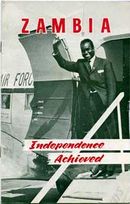
Zambia since 1964, despite its considerable mineral wealth, Zambia faced major challenges. Domestically, there were few trained and educated Zambians capable of running the government,[1] and the economy was largely dependent on foreign expertise. Most of Zambia's neighbouring countries were still colonies or under white minority rule.
The United National Independence Party (UNIP) won the pre-independence elections, gaining 55 of the 75 seats. The Zambian African National Congress won 10 seats, and the National Progressive Party won all the 10 seats reserved for whites.[2] Kenneth Kaunda was elected Prime Minister, and later the same year president, as the country adopted a presidential system. Kaunda adopted an ideology of African socialism, close to that of Julius Nyerere in Tanzania. Economical policies focused on central planning and nationalisation, and a system of one party rule was put in place.
One party state
In 1968 Kaunda was re-elected as president, running unopposed. During the following years Zambia adopted a one party system. In 1972 all political parties except UNIP were banned, and this was formalised in a new constitution that was adopted in 1973. The constitution framed a system called "one-party participatory democracy", which in practise meant that UNIP became the sole political factor in the country. It provided for a strong president and a unicameral National Assembly. National policy was formulated by the Central Committee of UNIP. The cabinet executed the central committee's policy. In legislative elections, only candidates running for UNIP were allowed to participate. Even though inter-party competition was out of question, the contest for seats within UNIP was energetic. In the presidential elections, the only candidate allowed to run was the one elected as president of UNIP at the party's general conference. In this way Kaunda was re-elected unopposed with a yes or no vote in 1973, 1978, 1983 and 1988.

This did not, however, mean that there was no dissension to the imposition of a one-party rule in the country or within UNIP. Sylvester Mwamba Chisembele who was Cabinet Minister for Western Province (previously Barotse Province) together with UNIP leaders from 7 out of the 8 Provinces established a Committee of 14. The objective of the Committee of 14 which consisted two leaders from each of the 7 provinces was the establishment of a democratically elected council of two leaders from each province to rule the country by consensus with the President as Head of State. If this had been achieved, it would have meant the curtailing of the absolute power residing in President Kaunda. The Committee of 14 attended a meeting in State House at which President Kaunda agreed to consider their proposals. However, later he banned the Committee of 14 and this action was followed by the suspension of Sylvester Chisembele and several leaders were sacked.[3] Chisembele later rejoined the Cabinet as Minister for Eastern Province and two years later in 1977 he was transferred in the same position to the Copperbelt Province, where the political situation was tense, especially so because of the forthcoming General Elections. Simon M. Kapwepwe and Harry Mwaanga Nkumbula, who, before the declaration of a One Party State, had been leaders of the UPP and ANC political parties respectively, had joined UNIP with the intention of challenging for the Presidency. However, their attempt to challenge President Kaunda for the Presidency on the UNIP ticket failed as both were prevented and disqualified by the manipulations of President Kaunda, who stood unopposed. Simon Kapwepwe and Harry Nkumbula challenged the resultant 1978 election of President Kaunda in the High Court, but unsurprisingly their action was unsuccessful.
Kaunda: 1964 - 1991
In the early years of independence Zambia's economy flourishes. The mineral rights of the British South Africa Company now accrue to the state. And copper prices rise dramatically, largely because of the needs of the Vietnam War. But the economy takes a serious downturn during the 1970s. There is a major collapse in the price of copper in 1975, while the cost of imported oil soars. Even more significant is the damage caused by Zambia's proximity to Rhodesia. With the declaration of UDI by Ian Smith, in 1965, Zambia becomes the frontline state in Africa's struggle against this act of white supremacy. Kaunda takes a lead in opposing the Smith regime - a stance which includes offering safe havens to guerrilla forces operating across the borders against Rhodesia, but which also invites armed retaliation by Rhodesian forces.
Even more significant is the economic consequence of being a land-locked neighbour of a nation which the international community is trying to isolate, after the imposition of UN sanctions on Rhodesia in 1968. Rhodesia has in the past been Zambia's main trading partner. It has also been the route by which Zambia's copper travels to the sea at Beira. Now an expensive railway link has to be constructed, with a massive Chinese loan, to the distant port of Dar es Salaam. These difficulties cause Kaunda to impose a state of emergency. With regular renewals by parliament, this evolves gradually into a state of normality. Kaunda's rule becomes increasingly authoritarian. Political opponents are harassed. In 1973 a new constitution turns Zambia into a one-party state. By the late 1980s the economy is in such a decrepit state that there are food riots in several towns.
Finally, in 1991, the national assembly withdraws the ban on political parties other than UNIP. Multiparty elections are held in October of this year. Their startling result gives Kaunda and Zambia undeniable credit, rare in Africa at this time, for high electoral standards.
The end of one party rule
One party rule and the declining economy created disappointment among the people. Several strikes hit the country in 1981. The government responded by arresting several trade union leaders, among them Frederick Chiluba. In 1986 and 1987 protests arose again in Lusaka and the Copperbelt. These were followed by riots over rising food prices on 30 June 1990, in which at least 30 people were killed. Few days later, Lieutenant Christopher Mwamba Luchembe of the Zambia Army attempted to a coup d'état to rid the Kaunda government. In the early hours of 1 July 1990, Luchembe announced a hostile takeover on state owned radio at the Zambia National Broadcasting Corporation (ZNBC). The attempt failed and the situation was curbed within three hours by the government, leading to the arrest of Luchembe.
These extensive protests made Kaunda realise the need for reform. He promised a referendum on multiparty democracy, and lifted the ban on political parties. This resulted in the quick formation of eleven new parties. Among these Movement for Multiparty Democracy (MMD), led by former union leader Frederick Chiluba, was the most important. After pressure for the new parties the referendum was canceled in favour of direct multiparty election.
Chiluba: 1991- 2002
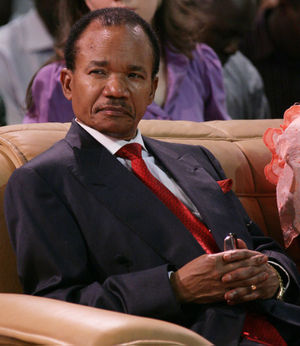
In the 1991 elections Kaunda's party, UNIP, was left with less than one sixth of the seats in the national assembly. A massive majority (125 out of the 150 seats) was won by MMD, the Movement for Multiparty Democracy. The MMD candidate, the trades union leader Frederick Chiluba, easily defeated Kaunda in the race for the presidency. The 1990s remain a time of great difficulty for Zambia. Copper suffers a further decline in value. Efforts to reform the bloated civil service inherited from Kaunda are painful and not entirely successful. And the MMD begins to lose its early reputation for a serious commitment to democracy and human rights. This was seen in particular in the continuing career of Kenneth Kaunda, who makes it plain that he hopes to regain his presidency. Strenuous efforts where made to prevent his standing against Chiluba.
Before the 1996 presidential election an amendment is added to the constitution requiring candidates to have parents who were native Zambians (Kaunda's were born in Malawi). In 1997 an opposition rally was fired on by police and Kaunda was slightly wounded. Later in the same year he is accused of having abetted an abortive military coup. He was placed under house arrest, but was released in June 1998 when all charges were withdrawn. In November 1999 Kaunda's son Wezi, prominent in UNIP, was assassinated (why or by whom is not known). Meanwhile in 1996 Chiluba is re- elected to the presidency for the second of the two consecutive terms allowed in the constitution. And the MMD increases its majority from 125 to 127 seats in the national assembly.
Coups and emergencies
In 1993 the government-owned newspaper The Times of Zambia reported a story about a secret UNIP plan to take control of government by unconstitutional means, called the "Zero Operation Plan". The plan included industrial unrest, promotion of violence and organisations of mass protests. UNIP did not deny the existence of such a plan, but underlined that it was not a part of their official policy, but the views of extremists within the party. The government responded by declaring a state of emergency and putting 26 people into detention. Of these, seven, including Kenneth Kaunda's son Wezi Kaunda were charged with offences against the security of the state. The rest were released.[4]
Prior to the 1996 elections, UNIP formed an alliance with six other opposition parties. Kenneth Kaunda had earlier retired from politics, but after internal turbulence in the party due to the "Zero Operation Plan" scandal, he returned, replacing his own successor Kebby Musokotwane. Chiluba's government then amended the constitution, banning people whose parents were not both Zambian citizens from becoming president. This was directly aimed at Kaunda, whose parents were both from Malawi. In protest UNIP and its allies boycotted the elections, which were then easily won by Chiluba and the MMD.
In 1997 matters escalated. On 28 October a coup d'état attempt took place, as a group of army commanders took control over the national radio station, broadcasting a message stating that Chiluba was no longer president. The coup was brought to an end by regular forces, after Chiluba had again declared a state of emergency. One person was killed during the operation. After the failed coup the police arrested at least 84 people accused of involvement.[5] Among these were Kenneth Kaunda and Dean Mungomba, leader of the opposition party the Zambia Democratic Congress. The arrests were condemned and criticised as illegal inside as well as outside Zambia, and accusations of torture were made as well.[6] Kaunda was released in June the following year, but 44 of the soldiers who took part in the coup were sentenced to death in 2003.[7]
2001 elections
Prior to the elections in 2001 Chiluba tried to change the constitution to allow him to run for a third term. He was forced to step back on this point after protest from within the party as well as from the Zambian public.
Mwanawasa: 2002-2008
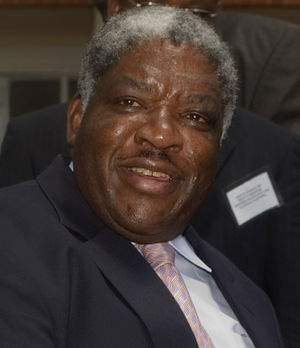
Prior to the elections in 2001 Chiluba tried to change the constitution to allow him to run for a third term. In August 2001, the National Executive Committee of MMD elected Mwanawasa as its presidential candidate for the 2001 election. He won the election, held on 27 December 2001, with 29% due to Zambia's first past the post system, beating 10 other candidates including two other former vice-presidents (Godfrey Miyanda and Gen. Christon Tembo); Anderson Mazoka came in a close second with 27%, according to official results. Mwanawasa took office on 2 January 2002.
First term as president
In February 2002, Mwanawasa's government filed defamation charges against The Post editor Fred M'membe and opposition lawmaker Dipak Patel for an article in which M'membe quoted Patel as calling Mwanawasa a "cabbage", an apparent reference to his injuries.[8]
However, in a move Mwanawasa described as an attempt to promote "national reconciliation", Mwanawasa appointed a number of opposition lawmakers to his cabinet in February 2003, including Patel of the FDD as Minister of Trade, Commerce, and Industry, and Sylvia Masebo of the ZRP as Local Government Minister. However, Godfrey Miyanda, himself also belonging to the opposition, opposed the move and threatened to file a lawsuit over it.[9]
In January 2005, Mwanawasa apologised to the nation for failing to tackle Zambian poverty. About 75% of the country's population lived on less than $1 a day,[10] the United Nations' indicator of absolute poverty.
He was elected as President of the MMD for a five-year term in 2005.[11]
2006 election
Mwanawasa ran for a second term in the presidential election held on 28 September 2006. Michael Sata of the Patriotic Front was considered his main challenger. His re-election was confirmed on 2 October; according to official results, he received 42.98% of the vote. He was sworn in for another term on 3 October.[12] A few days later, he named a new cabinet and appointed Rupiah Banda as Vice-President.[13]
Banda: 2008-2011
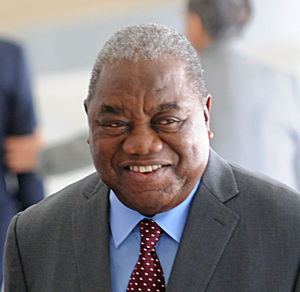
After Mwanawasa suffered a stroke while attending an African Union summit in Egypt on June 29, 2008, Rupiah Banda became acting President. He subsequently delivered a series of optimistic but vague updates on Mwanawasa's health. These updates were greeted with widespread skepticism, but Banda insisted that he had "no reason to lie".[14]
Mwanawasa never recovered from his stroke and died while still hospitalized in Paris on August 19, 2008. Expressing "immense grief and deep sorrow", Banda announced his death to the nation and declared a seven-day period of national mourning, urging Zambians to "remain calm and mourn our President with dignity".[15] Banda officially took over as acting President prior to a new presidential election, which according to the constitution should be called within 90 days of Mwanawasa's death.[16] As President, Rupiah Banda was focused on economic development, travelling abroad to promote Zambian trade to other world leaders. In December 2010 he travelled to Egypt to meet with President Hosni Mubarak.[17]
In mid-2009 it was announced that the MMD National Executive Committee had chosen Banda as the party's candidate for the 2011 presidential election. Some criticized this, arguing that the nomination process should be open to other candidates; Mpombo, the Defense Minister, resigned from his post in July 2009 while criticizing the process as undemocratic. President Banda has since welcomed others to challenge him for the nomination at the MMC Conventions taking place across the country.[18]
After taking office, Banda dismantled much of the anticorruption effort put into place by his predecessor, Mwanawasa.[19]
Banda's Special Assistant for Press and Public Relations was Dickson Jere.
Defeat and Immunity Removal
Michael Sata, leader of the opposition Patriotic Front, defeated Bwezani Banda in the September 2011 presidential election, ending his three-year presidency.
On the 15th March 2013, Banda became the second head of state in Zambian history to have his presidential immunity removed. This was due to accusations of abuse of authority, corruption and the misappropriation of oil revenue.[20]
Sata: 2011-2014
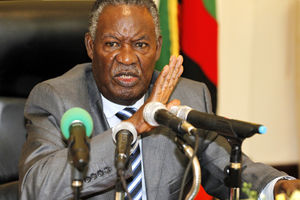
Sata ran for President for a fourth time in the election held on 20 September 2011. In the early stages of the campaign he was more vitriolic in his anti-Chinese rhetoric, but he later toned down his rhetoric. Results showed him receiving about 43% of the vote against 36% for Banda, and Chief Justice Ernest Sakala accordingly declared that he had won the election in the early hours of 23 September. He was sworn in later in the day.[21] He was said to have won because of the urban vote. Despite the toning down of his rhetoric, the investment climate in Zambia was considered uncertain in the wake of his victory.
Policies
On 8 September 2008, Sata claimed that he would protect Chinese investments if he was elected, abandoning the hostility towards Chinese investment that he had expressed during the 2006 presidential election campaign.[22]
During the 2006 election campaign he was reported to have said of Zimbabwean President Robert Mugabe that "Mugabe hasn't done anything wrong. It is the imperialists, the capitalist-roaders, who say he is a villain."[23]
In 2008, he said that he would revoke licenses for foreign investors if they resisted his orders to give at least a 25% stake in their companies to Zambians.[24]
Lungu: 2015-Present
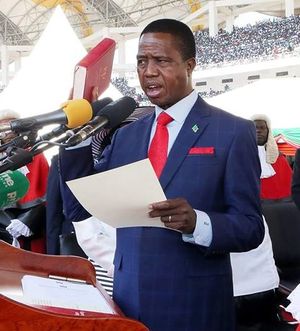
After Michael Sata's death on 28 October 2014, Scott became acting president. The constitution of Zambia requires a new election within 90 days to permanently fill the office.[25]
The constitution of Zambia requires that both parents of presidential candidates are "Zambian by birth or descent", thus Scott was considered ineligible to stand in the January 2015 election.[26] The provision was put in place by President Frederick Chiluba to prevent Kenneth Kaunda – whose father was born in what became Malawi – from becoming president.[27] However, a previous judgement by the Zambian Supreme Court, in a similar case in 1998, could have validated him as a potential candidate.[28] Scott did not stand as a presidential candidate for the Patriotic Front. Edgar Lungu, standing as the PF candidate, won the January 2015 presidential by-election and succeeded Scott as President on 25 January 2015.[29] Lungu was sworn in as President of Zambia on 25 January 2015 at the National Heroes Stadium in the capital Lusaka.[30]
The following month, Lungu forced the head of the country's central bank out of office and promised lower interest rates. He appointed Inonge Wina as Zambia's first female Vice-President.[31]
In March 2015 Lungu collapsed while holding a speech commemorating International Women's Day in Lusaka. After spending a short while in a Zambian hospital he had an operation for his narrowed oesophagus in Pretoria, South Africa.[32][33]
Lungu commuted the death sentences of 332 prisoners to life in prison on 16 July 2015 and condemned the massive overcrowding at the Mukobeko Prison, calling it "an affront to basic human dignity".[34]
In October 2015, Lungu ordered a national day of prayer, to prevent further damage to his country's economy. Top religious and political officials participated, and other public events were cancelled.[35]
Second presidential term (2016-)
Lungu ran for reelection in the 2016 election, which turned out to be a rematch of the 2015 presidential election between him and Hakainde Hichilema of the United Party for National Development. Lungu won the election with 50.32% of the vote, thus avoiding a run-off and also increasing his margin of victory over Hichilema to 100.530 votes or 2.72%. Hichilema refused to concede defeat after the announcement of official results and filed a case before the Constitutional Court, asking for the results to be nullified due to irregularities. The court dismissed the case on 5 September 2016 and Lungu will be inaugurated for a full five-year term of office on 13 September.
References
- ↑ There were only eight indigenous Graduates in the country at Independence
- ↑ Lua error in Module:Citation/CS1 at line 4515: attempt to index field 'date_names' (a nil value).
- ↑ 21 April 1971.
- ↑ Lua error in Module:Citation/CS1 at line 4515: attempt to index field 'date_names' (a nil value).
- ↑ Lua error in Module:Citation/CS1 at line 4515: attempt to index field 'date_names' (a nil value).
- ↑ Lua error in Module:Citation/CS1 at line 4515: attempt to index field 'date_names' (a nil value).
- ↑ Lua error in Module:Citation/CS1 at line 4515: attempt to index field 'date_names' (a nil value).
- ↑ 12 February 2002. URL.
- ↑ 8 February 2003. URL.
- ↑ "I failed Zambia, says president", BBC News, 10 January 2005.
- ↑ James Butty, "Zambia's Ruling Party Is Not Seeking Mwanawasa's Replacement, Spokesman Said", VOA News, 21 July 2008.
- ↑ Joseph J. Schatz, "Mwanawasa Sworn in As Zambia President", Associated Press, 3 October 2006.
- ↑ Shapi Shacinda, "Mwanawasa warns challenger, names new cabinet", Reuters (IOL), 9 October 2006.
- ↑ "Mwanawasa's condition 'promising'", Sapa-AFP (IOL), July 25, 2008.
- ↑ "STATEMENT BY HIS HONOUR THE VICE PRESIDENT, MR. RUPIAH BANDA, MP., ON THE DEATH OF THE PRESIDENT", Zambian Presidency website, 18 August 2008.
- ↑ "Zambian VP takes charge", Reuters (International Herald Tribune), August 20, 2008.
- ↑ Zambia eyes Egyptian investment – Economy – Business – Ahram Online. English.ahram.org.eg (2010-12-30). Retrieved on 2011-06-21.
- ↑ [1] Archived January 13, 2011, at the Wayback Machine.
- ↑ Barry Bearak. "Frederick Chiluba, Former President of Zambia, Dies at 68". The New York Times. 20 June 2011. URL.
- ↑ http://www.mwebantu.com/2013/03/15/rupiah-banda-loses-immunity-from-prosecution/
- ↑ Lua error in Module:Citation/CS1 at line 4515: attempt to index field 'date_names' (a nil value).
- ↑ Shapi Shacinda, "Sata warms to Chinese investment in Zambia", Reuters, 8 September 2008.
- ↑ "Long queues in tight Zambian poll", BBC News.
- ↑ "Sata to help local investors", News24.
- ↑ Zambia's Guy Scott makes history as white president in sub-Saharan Africa, Faith Karimi, CNN, 29 October 2014.
- ↑ Kim Yi Dionne. "Another Zambian president dies in office. What happens now?". The Washington Post. 29 October 2014. URL.
- ↑ Lua error in Module:Citation/CS1 at line 4515: attempt to index field 'date_names' (a nil value).
- ↑ 28 October 2014. URL.
- ↑ Matthew Hill, "Zambian Ruling Party's Edgar Lungu Inaugurated as President", Bloomberg, 25 January 2015.
- ↑ Matthew Hill, "Zambian Ruling Party's Edgar Lungu Inaugurated as President", Bloomberg, 25 January 2015.
- ↑ Matthew Hill,"Zambia Central Bank Chief Replaced as President Vows Lower Rates", Bloomberg, 13 February 2015.
- ↑ Lua error in Module:Citation/CS1 at line 4515: attempt to index field 'date_names' (a nil value).
- ↑ Lua error in Module:Citation/CS1 at line 4515: attempt to index field 'date_names' (a nil value).
- ↑ "Zambian president gives death row inmates life sentences", Reuters, 16 July 2015.
- ↑ "‘God have mercy on currency’: Zambia holds national prayer day to hold Kwacha from record drop", RT, 18 October 2015.
